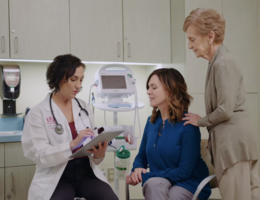

September is Gynecological Cancer Awareness Month, a dedicated time spotlighting women's health and well-being. Gynecologic cancers include all cancers of the female reproductive system such as the cervix, ovaries, uterus, vagina, and vulva. This annual observance is a reminder of the importance of raising awareness about health issues that affect millions of women worldwide.
Yevgeniya Ioffe, MD, a gynecologic oncologist at Loma Linda University Health, answers questions ranging from cancer screening and HPV vaccination to the importance of awareness and early detection.
What's the best way to prevent gynecologic cancers?
Cervical cancer has become highly preventable thanks to the Human Papillomavirus (HPV) vaccine. The HPV vaccine is recommended for ages 11-12, with catch-up vaccinations available for individuals up to age 45. This extension allows those who missed vaccination in their pre-teens to benefit from its protection. The focus has shifted towards detecting and treating precancerous lesions known as dysplasia before they progress to full-blown cancer.
Unlike cervical cancer, routine screening for endometrial and ovarian cancer is not recommended for all women. Instead, screening is reserved for those with a genetic predisposition, which can be identified through genetic testing. Ioffe stresses the importance of identifying high-risk individuals, as it can guide early interventions and improve outcomes. Regular check-ups with primary care providers or OB/GYNs remain essential for overall health.
What advice do you have for young women who might be nervous about their first women's health visit?
First-time gynecologic visits can be intimidating for first-time patients, but it's a relatively easy and short exam. Patients should also feel empowered to discuss their preferences and comfort levels with their healthcare provider.
Are there specific age groups that should pay attention to gynecologic health?
Cancer prevalence tends to increase with age. While ovarian cancer is rare in younger women, postmenopausal bleeding should never be dismissed as normal. Any changes in abdominal pain, bloating, bowel habits, or bladder habits warrant a visit to an OB/GYN, particularly for older women.
Are there lifestyle choices to live by that can help with gynecologic cancer prevention?
Refrain from smoking because it is associated with cervical cancer. Maintaining a healthy weight is also essential because obesity can increase the risk of endometrial cancer due to estrogen conversion.
How have technology and medical advancements improved gynecologic care in recent years?
Advancements in technology have revolutionized gynecologic care. HPV testing enhances sensitivity in detecting abnormalities, allowing early intervention. MRIs help classify findings and guide treatment decisions. Precise radiation therapy and molecular testing of tumors improve treatment outcomes. Genetic testing identifies high-risk individuals, allowing for risk-reducing procedures.
Can you talk about the importance of raising awareness about gynecologic cancers?
These cancers often receive less attention and funding compared to other types. Reducing the stigma and increasing awareness of symptoms and treatments can improve early detection, survival rates, and outcomes.
Overall, I would say that gynecologic health has come a long way, with advancements in prevention, screening, and treatment. Awareness, early detection, and understanding of family history remain pivotal in safeguarding women's health. As we continue to make strides in gynecologic care, the future looks promising, offering hope for improved outcomes and the potential eradication of these cancers.
From breast health to gynecologic care, treatment of pelvic pain and female cancers to menopause management, incontinence, and beyond, Loma Linda University Health cares for the whole woman. To learn more about women's health, visit online.


